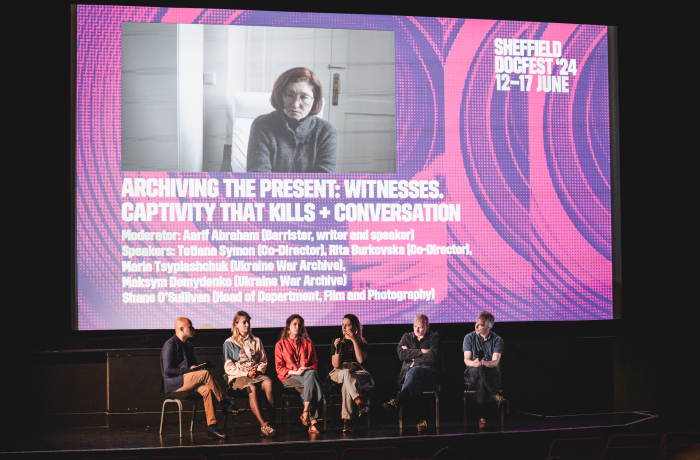
After its debut screening at the 21st Docudays UA, the film Witnesses. Captivity Kills about the terror attack in Olenivka was presented in the UK: at Sheffield DocFest and at a charity screening in central London. The Ukraine War Archive team, who created the film, attended the international premiere and spoke about the audience, context, and meaning of their work for cultural diplomacy. In this article, each of the four delegates, namely the director Tetiana Symon, a co-founder of the project Maksym Demydenko, human rights advocate and competition jury member Maria Tsypyashchuk, and actor and interviewer Marharyta Burkovska share their varied impressions.
Tetiana Symon, coordinator of the interviewing department, co-director of the film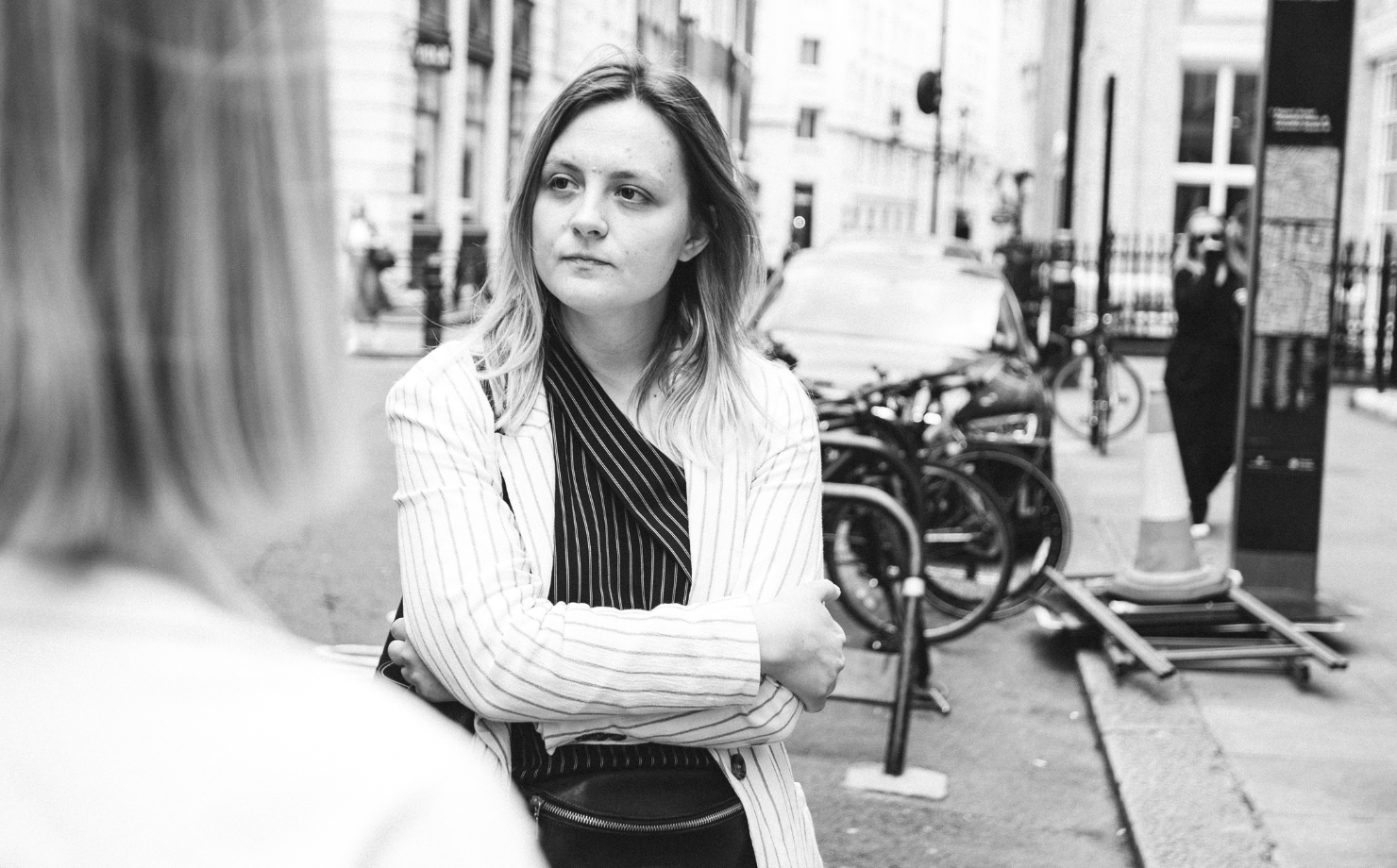
In Sheffield, there were two screenings of Witnesses. Captivity Kills. We also presented the Ukraine War Archive project at the first screening. We spoke about the functioning of our initiative, its achievements, advantages, about how it emerged. We were asked about the main goal of creating the film. It is quite simple: every day, so much horrible news happens in the world, so it is easy to lose focus. And that is why we wanted to highlight the terror attack in Olenivka, as well as the fact that 10,000 military members are still in Russian captivity and we know that all of them are being tortured. More severely or less, but all of them to some extent, unfortunately. Even the conditions of their detention are already a kind of torture. Ukrainian diplomacy does a lot, Ukrainian civil society as well, but we need to reach the international level with the issue of prisoners of war exchange.
When we hear about a fact of a war crime, which Russia commits in Ukraine in incredible numbers, it is perceived as “dry” numbers. But behind each of these numbers, there is not only an individual person, but an entire community. First of all, these are their family, loved ones, friends and colleagues. Essentially, this affects absolutely all Ukrainians. And that is why, when we were making Witnesses. Captivity Kills, we wanted to show this impact on the entire society. Both on the people who were captured and have, fortunately, returned from there. And on the women who are waiting for their husbands or sons to return, or those who will, sadly, never see them again because their loved ones have been killed. And when the international audience sees this specific story, you are talking to them in the language of humanity. I think that this is the main advantage of this way of communication for cultural diplomacy.
In addition, at the film festival, I was invited to a panel discussion on working with archives. The main subject of this conversation was that we were supposed to talk about the ethical challenges of our work and other difficulties. I shared the experience of creating Witnesses and our project. The other participants were Alex Wilson, a British filmmaker who has been working with archives for 15 years, and Lamees Almakawwy, a palestinian filmmaker who explores personal family records.
I emphasised that during our work on the film Witnesses. Captivity Kills, the most difficult task was actually to find a balance between what we should show on screen and what we should not. Both for safety reasons and for ethical reasons. The Archive team has a responsibility: 10,000 people are still in captivity. And almost all the people from Azovstal are waiting for release. For example, among the survivors of the terror attack in Olenivka, only 22 people have been returned home, and only 10 of those who were severely wounded. The severely wounded people from these barracks are also still in captivity. So it was important for us to discuss with the interviewees all the details which we have the right to disclose right now.
Our British colleague shared how he made a film from 40-year-old archival footage about a police provocation against miners in Sheffield. Back then people were injured and killed. But nobody saw the files for a long time. Only in 40 years were they found and published. And this gives us confidence in the necessity of focusing on everything we do. If not all crimes are investigated today, their time will come. The most important thing is to record and store them.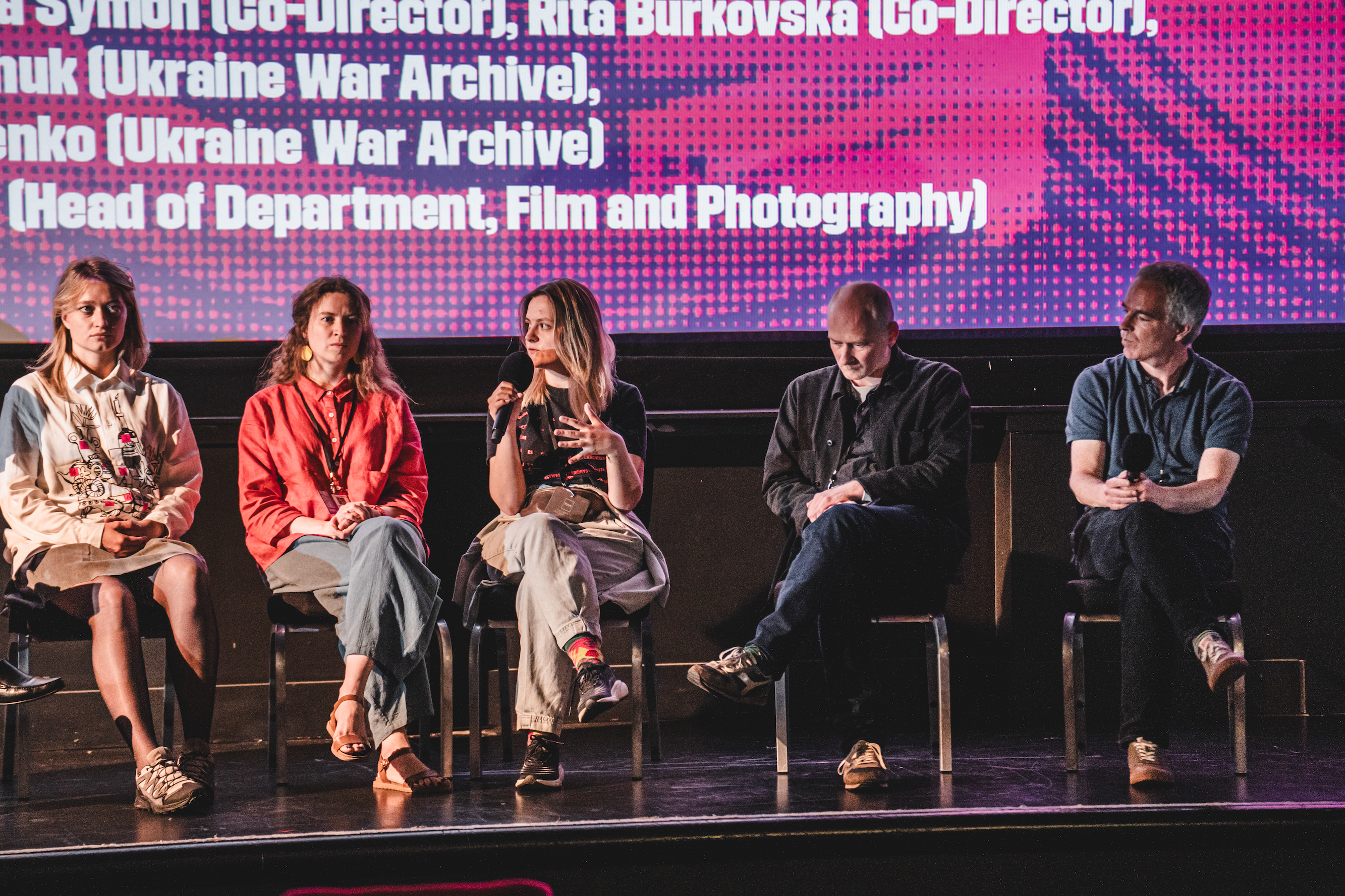
The Ukraine War Archive team at the discussion after the screening: Marharyta Burkovska, Maria Tsypyashchuk, Tetiana Symon, Maksym Demydenko. Photo by Anh Do.
As for the people who came to the screenings in Sheffield, it is an international film festival audience, international guests. The audience were genuinely interested in our film and actually watched and stayed for a conversation during the Q&A. It felt like they were truly concerned about the problems, the characters, it was very nice. And the thing I liked the most is the fact that they did not need explanations of our context, they were aware of the events in Ukraine.
The charity screening in London was organised by the Ukrainian community in the UK. It was an interesting audience, because it was divided into Ukrainians themselves and representatives of global organisations that support us, such as Film + TV Charity, Talented U. It’s great that this screening happened, because we were able to connect with these people and tell them in a more targeted way how exactly they could help Ukraine. We emphasised that it was important to draw attention and engage people, especially abroad, locally, and appeal to their parliament representatives to encourage them to facilitate POW exchange.
Maksym Demydenko, co-founder of the Ukraine War Archive, head of Infoscope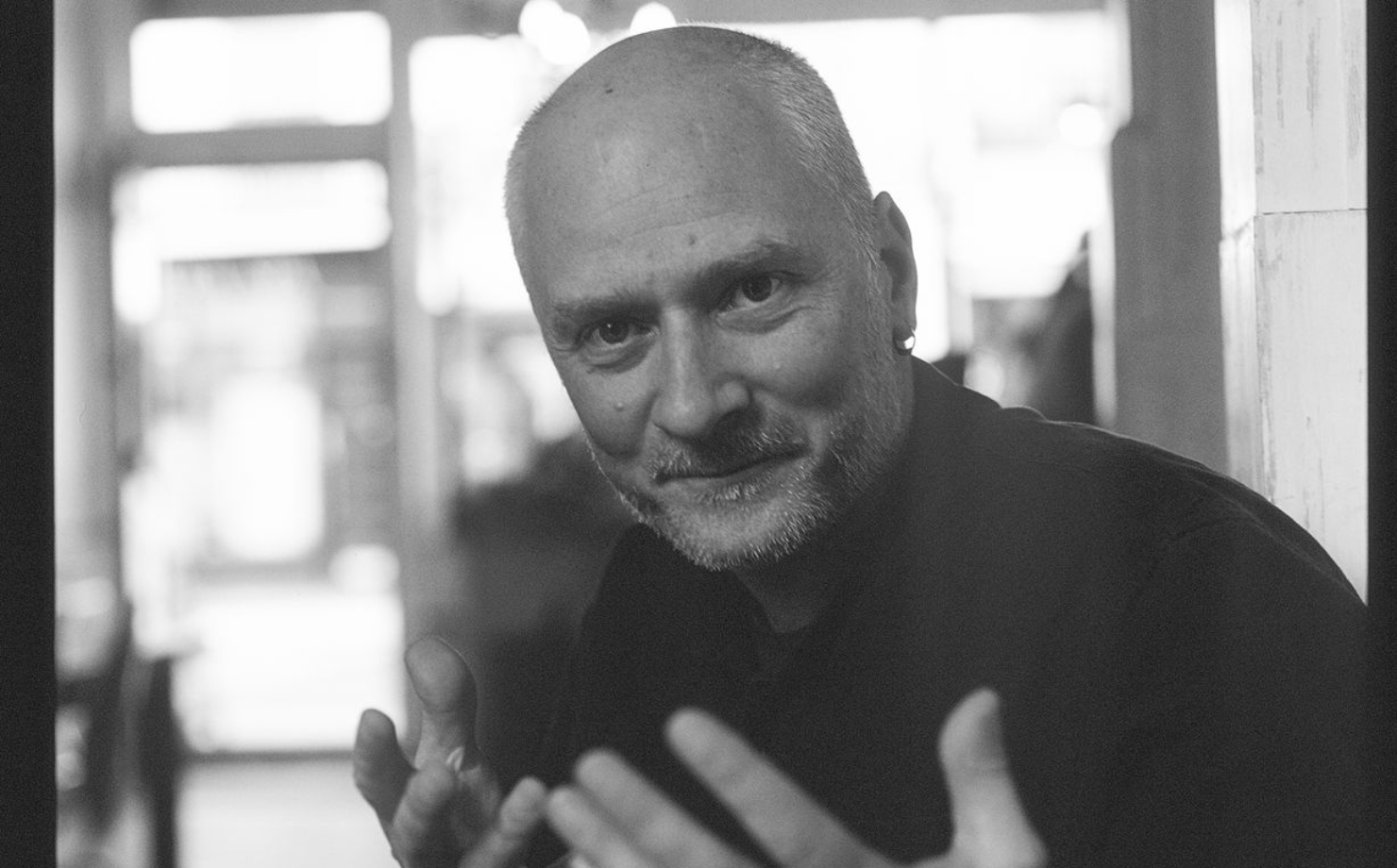
The discussion after the screening was very interesting. Aarif Abraham, the moderator and host, asked a broad range of questions related to the process of creating the film, collecting interviews and testimonies from the people in it, the mechanisms in the legal context, and the Archive in general.
In my answers to these questions, I emphasised the importance of our strict archiving processes which ensure the preservation and integrity of materials. We use advanced technology to protect and archive data in order to make the materials available to future generations. It is also important to note that our Archive is not created to be closed, it is created for active use. Which is why we initiate different projects ourselves and engage the Archive team to create films or exhibitions. We also work with various other institutions which work both in the field of culture and history and in the field of law, researching Russia’s crimes in Ukraine. Ethics are also a key element of our work: we always seek to uphold the dignity and privacy of the individuals whose stories we document, and we have strict confidentiality and information security protocols.
As for unexpected responses after screenings, I will note that some viewers were surprised by our direct connection with Azov. It was interesting to discuss what these emotions meant. On the one hand, in my opinion, indirectly, subtextually, this emphasises the existence of stereotypes and myths developed by enemy propaganda. We could feel people’s surprise that it is even possible to have communication with Azov. That they are people who are open to communication. On the other hand, this surprise could have been due to the generally non-obvious access by filmmakers and archivists to testimonies about the defence of Azovstal and the fact that there are survivors of this horrible historic event and we can directly ask them about the experience. In any case, our work demonstrates reality without filters or biases, which is the basis for objective documentation.
We can see prospects for the Ukraine War Archive in opening new possibilities for interaction with people and for dialogue, bringing together a lot of various initiatives on the same platform. We support topics that are important to audiences in Ukraine and beyond. We constantly expand the circle of our partners that both submit materials to the Archive and use our data, collected, analysed and prepared.
Maria Tsypyashchuk, human rights advocate, partnership coordinator at the Ukraine War Archive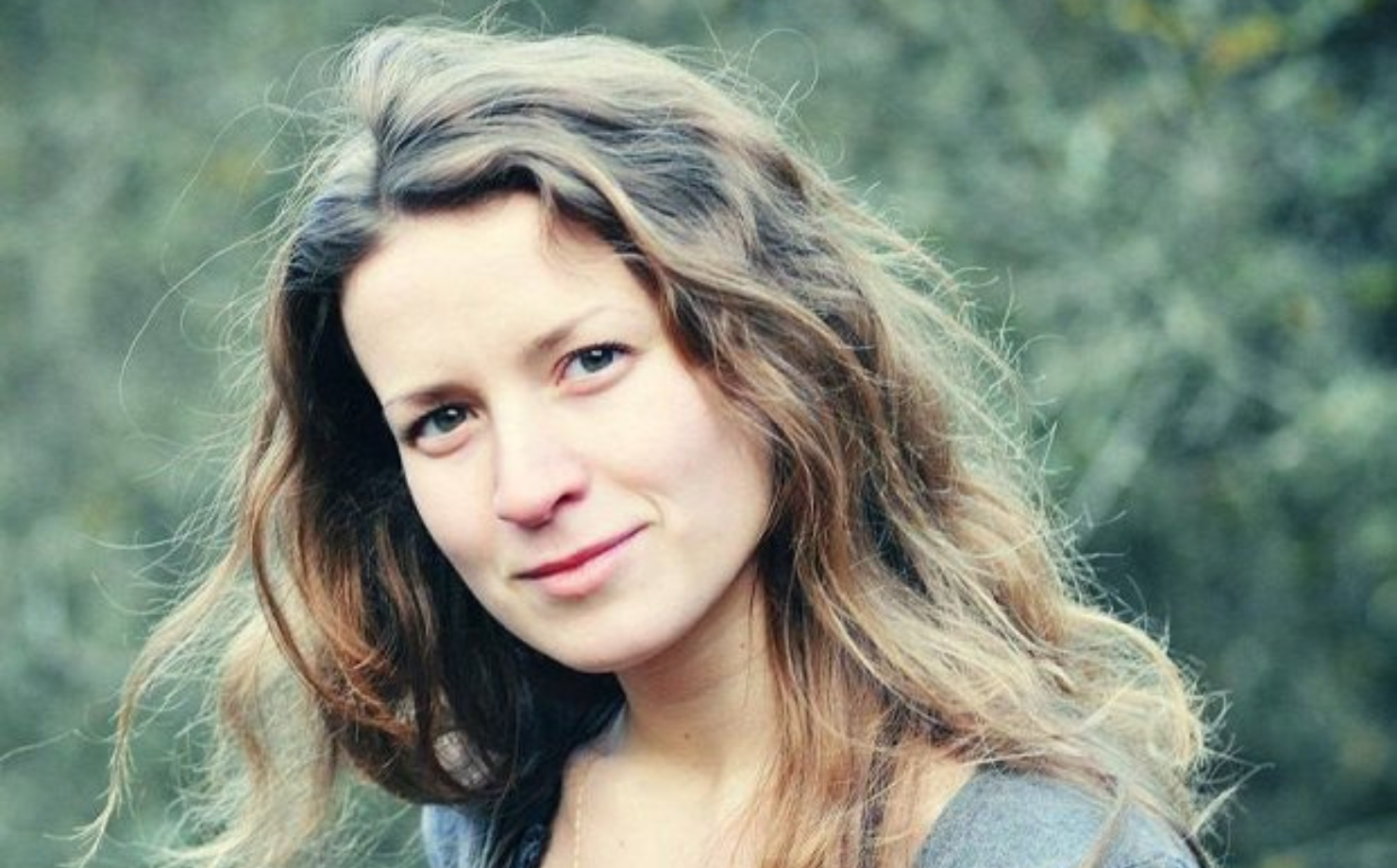
I am glad that we had an opportunity to speak about the Russia-Ukraine war with a very broad audience, to talk about what is actually happening. About the main war crimes that are being committed, the models and patterns of brutal treatment used by Russians against imprisoned military members and against civilians who are illegally detained. After all, about why it is even important to have these archives, to process information for investigation and for bringing the perpetrators to responsibility. And for memorialisation, to give voice to those who have suffered from the war.
I’ve had experience as a jury member at the film festival (Tim Herrington Award), which was a first for me, and it was a very authentic experience. I was a bit scared to evaluate films because I don’t have any background in cinema, only in law. We had a discussion from various perspectives in a circle of three jury members: Joan Parsons, Head of Culture and Arts of Queen's University Belfast; and Toni Kamau, producer and founder of the Kenyan company We Are Not the Machine, who is also an activist and works in the field of human rights.
But the process was very interesting, every film I was supposed to evaluate was strong. The authors raised topics from the comprehensive understanding of how and why the processes of democracy and human rights advocacy fail, for example in the film Democracy Noir about the experience of Hungary and the policies of Orban and the Fidesz party; and the film on which the opinions of all jury members converged, No Other Land about the Palestine-Israel conflict. My personal favourite, after the winner, was Breaking the Cycle about Thailand and the numerous military coups there since 1932. While every military junta rewrites the constitution, in 2018 a new youth party emerges which actually shakes the Thai society, young people who have started voting and realising that living with this social order is not great, it needs to be changed.
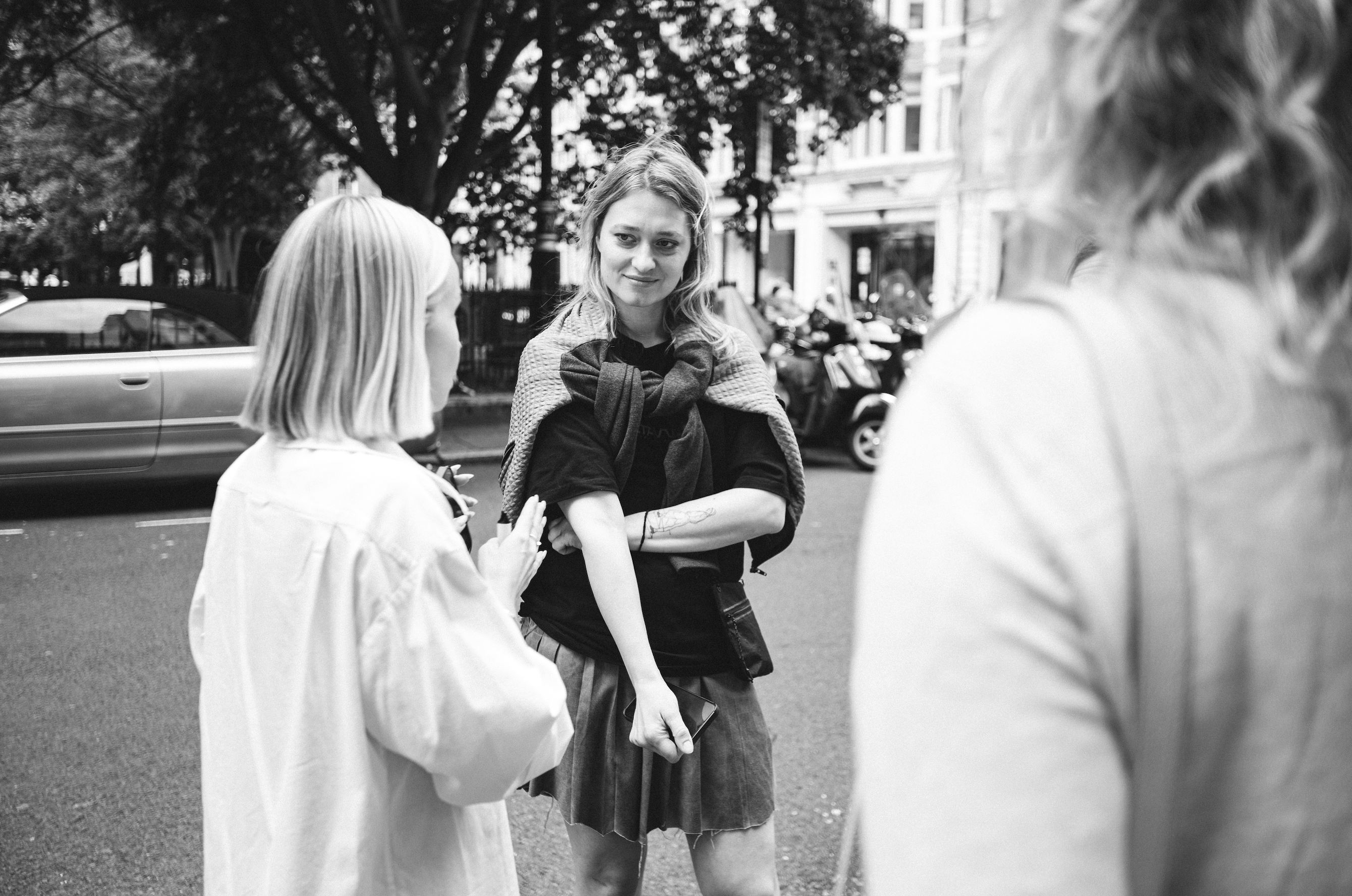
The film festival audience seemed quite attentive to me, the things people saw were important to them, they watched the film with respect and were open to information. Plus, in my opinion, the fact that these were archival materials and testimonies by living people who talk and share their experiences really reinforced the perception. I felt like we had a major information gap, so the international audience does not know about our events. I’m not sure if they were aware of the terror attack in Olenivka, or the number of military members (10,000) and civilian hostages (7,000) who are in captivity. We were asked very attentive questions, some of them I would divide into questions about the Archive technologies and questions about how to communicate, how to record conversations with people who have had traumatic experiences and witnessed war crimes. Many people asked how a person can trust us, how we can work with them — this was my case, because I find people and record them for the Archive. This made me think that the person recording the testimonies is not just someone who can click the camera button, they are not just a cameraperson, it’s a special role and skill to document testimonies of war crimes.
I shared with the audience the stories of people whom we recorded. I wanted to build empathy for people living in Ukraine and the things they face due to the war. I just talked about reality, and it affected people, I believe. We were approached and told that Witnesses. Captivity Kills is raw cinema in the good sense, the rawness makes it reliable and authentic.
I’ve had varied experiences of communication with the families of soldiers killed in Olenivka or of prisoners of war. Mostly these people wanted to talk, to tell their stories. But, of course, it was hard, because some of the mothers of our heroes from the interviews, for example, experienced the death of their sons, some were wounded, some, like Maria, are waiting for their husbands. The main thing, in my opinion, is just to want to listen to the person, give them an opportunity to tell their story. And the second thing is to be empathetic, understand what the person is facing. I mean, understand what it is like every day to be unable to relax or live a full life because you constantly have this soul connection to your loved one who is in captivity. With one protagonist, for example, after the conversation we went outside together and walked to the subway, because she was not local. We just had a walk and talked. She took out a loan to buy a couch for her son, and this motivates her to wait, but we did not just talk about captivity, we also just shared our existence for the 15–20 minutes of that walk. I think this is the most important thing, to see just living people in these conversations, without putting them in any boxes.
As an interviewer, I’m more sensitive and vulnerable to stories. The difficulty of my work is that you listen to this reality, you’re directly present around a person who is suffering. But what’s also important here is to keep the “star in the sky”, that is, remember why you’re doing this. And I think that love for a person, love for Ukraine, and the understanding that this can help people in the future and now it can also help people be released from captivity, all of this gives you strength and energy to just move along this path. To walk this path every day, step by step. Not focus on your own emotions, but be more effective and help others through this work. Publicity is very important to imprisoned civilians and soldiers, and we should remind international audiences about them. We held screenings in Sheffield and London and discussed how people can act wherever they are in the world so that prisoners of war are not forgotten and so that they can be brought home.
The conversation was recorded by Ksenia Opria, Marfa Bihdash
Photo credit: Anh Do, Vitaminka Photography, Maksym Demydenko, Yuriy Shushkevych
The trip was supported by the UK/UA Creative Partnerships programme, launched by the British Council in cooperation with the Ukrainian Institute.